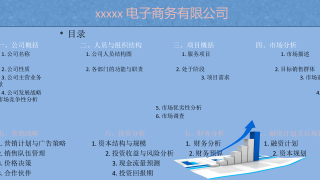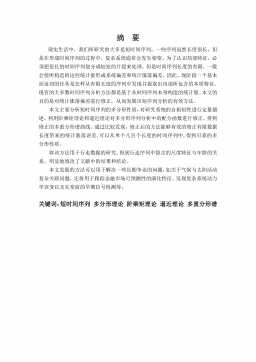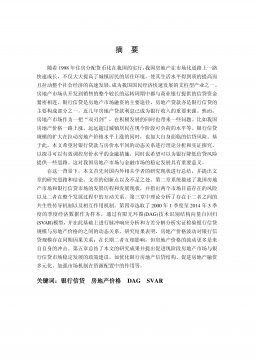奥古斯特.威尔逊剧作的隐喻研究
VIP免费
摘 要
奥古斯特·威尔逊(1945-2005)是美国 20 世纪一位著名黑人剧作家。他创
作了庞大的“匹兹堡系列剧”:以 20 世纪的每十年为背景,描绘了一部美国黑人
的世纪史诗。威尔逊推崇以非洲为中心的美国黑人文化传统在文学创造中的中心
地位。因此,他的每部剧都与美国黑人的非洲文化传统紧密结合,反映了 20 世纪
美国黑人所面临的挑战和问题。在威尔逊的十部剧中,最有代表性的四部戏剧是
《乔 ·特纳来了又走了》、《莱妮大妈的黑臀舞》、《钢琴课》和《篱笆》。因此,
本论文将运用认知语言学里的隐喻理论来分别阐释这四部戏剧中布鲁斯音乐的隐
喻性、社会仪式的隐喻性、口头叙述的隐喻性及威尔逊舞台表现的隐喻性,以此
来研究奥古斯特·威尔逊独特的戏剧风格。
本文包含六个部分,第一章简要介绍作家作品以及所要运用的相关理论;第
二、三、四和第五章,主要从概念隐喻的观点出发,分析了四部剧中布鲁斯音乐
的隐喻性、社会仪式的隐喻性、口头叙述的隐喻性及威尔逊舞台表现的隐喻性:
第二章探索了布鲁斯音乐对黑人的重要性,告诉美国黑人重建自我身份和开始崭
新生活的正确途径;第三章分析了社会仪式的隐喻性,威尔逊试图用这种方式告
诉他的同胞们究竟什么是连接现实和精神世界之间的桥梁;第四章研究了口头叙
述的隐喻性,揭示了美国黑人的隐喻天赋;第五章探讨了威尔逊独特的舞台表现
手法;第六章为结论部分。通过以上各章节的论述,本论文将从隐喻这一新的角
度解析威尔逊的四部名剧,充分理解其中的非洲传统元素,舞台表现形式以及威
尔逊剧作的主旨。
关键词:布鲁斯音乐 社会仪式 口头叙事 舞台表现 隐喻
CONTENTS
Acknowledgements
ABSTRACT
摘 要
Chapter 1 Introduction ...................................................................................................1
§1.1 August Wilson and His Plays .............................................................................1
§1.2 Literature Review ...............................................................................................4
§1.3 Overview ............................................................................................................6
Chapter 2 The Blues ....................................................................................................... 8
§2.1 The Influence of Blues on Wilson ..................................................................... 8
§2.2 Black History ..................................................................................................... 9
§2.3 Bargaining Chip ............................................................................................... 12
§2.4 Spiritual Power of the Blues ............................................................................ 13
§2.5 Responsibility .................................................................................................. 14
Chapter 3 Social Rituals ...............................................................................................16
§3.1 Linkage of the Past and the Present ................................................................. 16
§3.2 The Absence of Christian God .........................................................................17
§3.3 The Battle between Bible and Afro-centric Culture ........................................ 18
§3.4 Freedom ........................................................................................................... 20
Chapter 4 Oral Tradition .............................................................................................22
§4.1 The Strong Power of the Yoruba God ............................................................. 22
§4.2 The Blacks’ Scar .............................................................................................. 23
§4.3 The Function of the “Memory Board” .............................................................24
§4.4 Illusory Triumph over the Oppression ............................................................. 26
Chapter 5 Stage Performance ......................................................................................28
§5.1 The Employment of Story and Traditional Elements ...................................... 28
§5.2 Blacks’ “CP time” ............................................................................................29
§5.3 The Metaphor of “Dawn” and the Piano ..........................................................30
§5.4 Troy’s Imaginary Fences ................................................................................. 31
Chapter 6 Conclusion ................................................................................................... 33
Notes ............................................................................................................................... 35
Bibliography .................................................................................................................. 36
在读期间公开发表的论文 ............................................................................................ 39
Chapter 1 Introduction
1
Chapter 1 Introduction
§1.1 August Wilson and His Plays
August Wilson (April 27, 1945 – October 2, 2005) was one of the most important
contemporary playwrights in America. Critics acknowledged him as a significant new
dramatic voice in American theater. His literary masterpiece was the ten play series, The
Pittsburgh Cycle, for which he had enjoyed great critical success and had received four
New York Drama Critics’ Circle Awards (Joe Turner’s Come and Gone, Ma Rainey’s
Black Bottom, The piano Lesson, Fences). Each one was set in a different decade,
focusing on the comic and tragic aspects of the African-American experience in the
twentieth century.
Wilson was born in the Hill District of Pittsburgh, Pennsylvania, the fourth of six
children to a German immigrant baker, Frederick August Kittel, Sr. and Daisy Wilson,
an African American cleaning woman, from North Carolina (Bogumil, 1999). However,
He was brought up by his mother and barely met his father. By the time he was five, he
lived in a two-room apartment above a grocery store. Then, Wilson’s mother was
remarried to David Bedford in the 1950s when he was young, and the family moved
from the Hill to the so called predominantly white working class neighborhood,
Hazelwood, where they ran into racial hostility; bricks were thrown through a window
at their new home. They were soon forced out of their house and on to their next home.
In 1960 Wilson dropped out of high school after being falsely accused of
plagiarizing a twenty-page paper on Napoleon Bonarparte. Waiting for an apology from
his teacher and principal that never came, Wilson hid his decision to leave school from
his mother, anticipating her disappointment. At the age of 16, Wilson began working at
menial jobs that allowed him to meet a wide variety of people, some of whom he later
based his characters on. And Wilson made such extensive use of the Carnegie Library to
educate himself that they later awarded him a degree, the only such one they have
bestowed. Wilson, who had learned to read when he was very young, began reading
black writers there at the age of twelve and spent the rest of his teen years on educating
himself by reading Ralph Ellison, Richard Wright, Langston Hughes, Arna Bontemps,
and others.
Wilson opened up his writing career as a poet. In 1965, he bought his first
Metaphorical Analysis of August Wilson’s plays
2
typewriter and moved into a basement apartment in Pittsburgh’s Hill District. At that
time in his life, learning to become a writer was uppermost in Wilson’s mind, therefore,
he made the transition from poet to dramatist and began to concentrate his energies on
the cycle of American dramas focused on the black life in the twentieth century. His
early experiences and influences of the late 1960s and early 1970s helped shape his
dramatic vision. In addition, Wilson denied the emotional and financial support of his
biological father, he embraced the culture of the mother he admired and loved, adopting
his mother’s maiden name, Wilson, as his maiden name. Wilson recalls the importance
of the cultural training he obtained growing up in his mother’s house:
I learned the language, the eating habits, the religious beliefs, the gestures, the
notions of common sense, attitudes towards sex, concepts of beauty and justice,
and the responses to pleasure and pain... that my mother had learned from her
mother, and which you could trace back to the first African who set foot on the
continent. It is this culture that stands on these shores today as a testament to the
resiliency of the African-American spirit (Wilson, 2001: 15-16).
Furthermore, the relationship between Wilson and his stepfather was a conflicted
one and became a source for Wilson’s drama. David Bedford was a model for Troy
Maxson in Fences, and the tense relationship between Wilson and his stepfather was
revisited on the stage in the characters Troy and his son Cory.
In his plays, August Wilson gives voice to the nameless masses of Africans in
America and taps into their never-ending supply of untold stories: Those who have been
promised a place and a stake in the American Dream only to find that access to the
rights and freedoms promised to all Americans is in fact guarded and exclusive. On this
problem, Wilson wants to explore the African roots, the atavistic connection, African
Americans have to their ancestors, rather than simply portraying African American and
predicaments of American life. In Wilson’s opinion, there are and have always been two
distinct and parallel traditions in black art: that is, art that is conceived and designed to
entertain white society, and art that feeds spirit and celebrates the life of black America...
(Wilson, 2001). The second tradition came to his mind when the black American in the
confines of the slave quarters sought to invest his spirit with the strength of his
ancestors by conceiving his art, in his song and dance, a world in which he was the
spiritual center.
Moreover, Wilson declared that certain early artistic influences played a key role in
摘要:
展开>>
收起<<
摘要奥古斯特·威尔逊(1945-2005)是美国20世纪一位著名黑人剧作家。他创作了庞大的“匹兹堡系列剧”:以20世纪的每十年为背景,描绘了一部美国黑人的世纪史诗。威尔逊推崇以非洲为中心的美国黑人文化传统在文学创造中的中心地位。因此,他的每部剧都与美国黑人的非洲文化传统紧密结合,反映了20世纪美国黑人所面临的挑战和问题。在威尔逊的十部剧中,最有代表性的四部戏剧是《乔·特纳来了又走了》、《莱妮大妈的黑臀舞》、《钢琴课》和《篱笆》。因此,本论文将运用认知语言学里的隐喻理论来分别阐释这四部戏剧中布鲁斯音乐的隐喻性、社会仪式的隐喻性、口头叙述的隐喻性及威尔逊舞台表现的隐喻性,以此来研究奥古斯特·威尔逊...
相关推荐
-
跨境电商商业计划书模版VIP免费

 2025-01-09 28
2025-01-09 28 -
跨境电商方案范文VIP免费

 2025-01-09 14
2025-01-09 14 -
创业计划书VIP免费

 2025-01-09 18
2025-01-09 18 -
xx生鲜APP计划书VIP免费

 2025-01-09 12
2025-01-09 12 -
跨境电商创业园商业计划书(盈利模式)VIP免费

 2025-01-09 9
2025-01-09 9 -
跨境电商计划书VIP免费

 2025-01-09 14
2025-01-09 14 -
绿色食品电商平台项目计划书VIP免费

 2025-01-09 22
2025-01-09 22 -
农产品电子商务商业计划书VIP免费

 2025-01-09 9
2025-01-09 9 -
农村电商平台商业计划书VIP免费

 2025-01-09 14
2025-01-09 14 -
生鲜商城平台商业计划书VIP免费

 2025-01-09 21
2025-01-09 21
作者:侯斌
分类:高等教育资料
价格:15积分
属性:41 页
大小:469.29KB
格式:PDF
时间:2024-11-19






